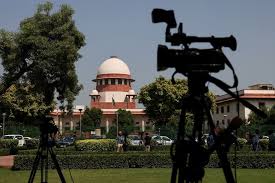The point in issue is whether the documents executed by IL&FS by which rents were made over to the respondent, Housing Development Finance Corporation Ltd (hereafter “HDFC” or “the lender”) constituted an assignment and thus fell outside the scope of an asset and security freeze order made by the NCLAT. (Para 1)
The parties agreed that the authorised indebtedness of IL&FS in terms of the MFA, by way of the facility together with the interest thereon was payable from the gross income and revenue to be derived from the operation of the Business Centre Services Agreements/Lease/Leave and License Agreement/s. It was also agreed that ‘all the receivables derived/to be derived from the operation of the Borrower’s Contracts, a sufficient portion of which, to pay the principal and interest as and when the same shall become due’ in terms of the said MFA was assigned and pledged and was to be ‘set aside for that purpose on the same day’ and a Power of Attorney by way of Security Interest was also executed between the IL&FS and HDFC. (Para 2)
HDFC and IL&FS claimed opposing reliefs: the lender, on the one hand, claimed- predictably that the interpretation and directions of former judge of this court in the orders/directions dated 12 May 2020 and 03 July 2020 were incorrect and had to be set aside; the borrower, IL&FS in its applications sought directions that Rs.112,79,18,348 (Rupees One Hundred Twelve Crore Seventy Nine Lakh Eighteen Thousand Three Hundred Forty Eight), appropriated from its accounts towards debt service payments, were in violation of the order dated 15.10.2018 from NCLAT and in compliance with the order passed by former judge of this court on July 3, 2020. (Para 7)
It was also held that since there was an express assignment of lease rental- sufficient to meet the principal and interest payments-, the “assignment has to be accepted as assignment” (Para 8)
The effect of these documents is what the court is concerned with. It is a known principle of contract interpretation, that the substance of a document, is discernible from its terms, rather than the label or its nomenclature. (Para 26)
That one document is styled or described in a certain manner, or that it uses a certain expression, or term is not conclusive; it is the effect of all the terms, of the documents, which bring out the true purport and intention of the parties. Likewise, another allied principle of contract interpretation, is that where the transaction is not the subject of one document, but several, which refer to each other, or a reading of all, describe the entire contract, then, it is open to the court to consider all of them together. (Para 27)
It would at this stage, be necessary to consider whether such amounts payable on a future date are to be considered property and, therefore, capable of transfer. Under the Transfer of Property Act, 1882, Section 5 states generally that all manner of property is capable of transfer. Section 6 lays out what are the kinds of properties or actions which are not transferable: these are “personal claims” in the nature of tortious claims and “choices in action” cannot be transferred. (Para 32)
“Actionable claim” is defined by the Transfer of Property Act, 1882 (hereafter “TPA”) in the following manner: “Section 3 Interpretation clause…. “actionable claim” means a claim to any debt, other than a debt secured by mortgage of immoveable property or by hypothecation or pledge of moveable property, or to any beneficial interest in moveable property not in the possession, either actual or constructive, of the claimant, which the Civil Courts recognise as affording grounds for relief, whether such debt or beneficial interest be existent, accuring, conditional or contingent:” Thus, in terms of Section 3 of the TPA, actionable claim means (a) claim to an unsecured debt (other than a debt secured by mortgage of immovable property, hypothecation or pledge (b) beneficial interest in a movable property. Both these are recognised as enforceable. Other claims, however, do not fall within the expression “actionable claim”. (Para 33)
The earlier discussion in this judgment, about the true nature of the transaction in this case led this court to hold that it is an assignment and not a pledge. The reference to pledge, in some places in the documents, did not undermine the fact that the rents payable to and receivable by the lender (IL&FS) stood absolutely assigned to HDFC. The provisions of the TPA and the discussion of the various authorities support the conclusion that there can be a transfer of debts, which are defined as actionable claims. In the present case, the rents payable by IL&FS tenants, lessees and licensees are debts, which stood transferred to the creditor, i.e. HDFC Bank. Therefore, the NCLAT’s conclusions are unexceptionable; the challenge to its correctness, therefore fails. (Para 39)
SUPREME COURT OF INDIA
2023 STPL(Web) 367 SC
[2023 INSC 929]
Infrastructure Leasing And Financial Services Ltd. Vs. Hdfc Bank Ltd. & Anr.
Civil Appeal No(S). 4708 of 2022-Decided on 19-10-2023
https://stpllaw.in/wp-content/uploads/2023/10/2023-STPLWeb-367-SC.pdf







